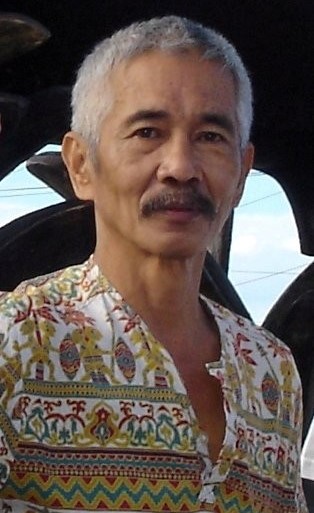TWO CENTS
By Dong Delos Reyes
Soil silence
Share
Every flood has a silver lining- for that strip of land wedged between a natural rainwater catchment basin (we've taken to calling it "nabao") and a river flowing from the Sierra Madre, skewering through a portion of Pambuan in Gapan, Nueva Ecija. For that land, every flood brings another layer of nutrient-rich silt (banlik) that feeds food crops raised on that strip.
A palisade of kirisol or tubang bakod, Jatropha curcas, that failed source of biodiesel fences the tapestry of crops grown there, within the five-meter zone off the river's water line.
Unlike urban tracts of public domain as law provides, not a single hovel nor ramshackle shanty stands on that land. There's just a semblance of an open shed for tools to turn the ground. Why, tickle the ground with plow or hoe- and it laughs in foliage, flowers and fruits.
On that spread came a lesson that distinguished the Tagalog concepts of "owner" (may-ari) and "creator" (may gawa). The owner has a title to the plot but it is the non-owner creator who works, creates something from the land. And in the monsoon seasons, that nameless creator grew rows and rows of corn, eggplants, finger chilis and peanuts.
It was a romping ground of sorts for children who took to taking corn ears, grilled them onsite, a practice called pugera. There were also eggplants and chilis for the taking. The old man didn't seem to mind such petty thievery. We minded that we were not caught. And we didn't mind the ground-grazing peanut bushes.
If the feng shui belief about rhyme and reason holds true, mani is also money- and it was growing vigorously in patches, an all-around crop that withstands floods and droughts. Sure, peanut oil goes into the making of nitroglycerin, prime ingredient in the manufacture of dynamite. All we saw was an explosion of green and growth.
Peanuts are legumes. They're next of kin to sigarilyas, sitaw, batao, patani- strange that their pods grow underground. That quaint quality tells you something of their function in restoring soil nutrients- aside from turning up as an ingredient in over 300 products, including motley industrial uses, including use as components in cosmetics and paints. And gourmets will tell you peanut oil tastes better than virgin olive oil in salads.
When the bushes are abloom with yellow flowers that looks a tad like wee butterflies, the peanuts are ready for harvest. Plow between the rows, then, uproot the bushes with their pods grown full and fat. Some of the pods are gathered, some plowed back into the ground for soil nourishment. Some of those pods are left jutting out into the sun. Sun-roasted, those stray pods yield what we call maning sungsung- usually available in Chinatown delis.
A portion of the harvest is set aside, dried, then, roasted, toasted- not to be used as ingredient for kare-kare, no sir. The slightly burnt roasted nuts go into something more delicious: ersatz chocolate!
If you're a fan of Choc-Nut (which is largely peanut butter sans the oily moisture), peanut chocolate is a must-try. It's the slightly burnt nuts that give peanut chocolate its exquisite slightly bittersweet flavor so different from dark chocolate. It is always served thick, not unlike chocolate espeso stirred to creamy silken smoothness with a batirol.
Maybe, there's some truth to that feng shui belief that growing mani is akin to growing money. Last time I checked, that strip of land of our fond boyhood memories had been ripped to shreds, the silt cover carted away to be sold as garden soil. The layer of pebbles and fine sand beneath the silt had been similarly hacked out by earth-moving equipment, dumped into trucks, carried off to some lumber and hardware outfits for sale as gravel and sand.
That erstwhile stretch of green is now a quarry site.
Comments
About the Columnist

Dong A. de los Reyes began his writing journey in 1978 as a business reporter. He tacks over 20 writing awards- five from the Don Carlos Palanca Memorial Awards for Literature- for his forays into fiction, poetry, and dramaturgy. He also describes himself more of a soil scientist than agronomist. He is a keen student of the combat arts, with a second degree black belt in gojukai, which was developed by a peasant from Okinawa named Chojun Miyagi. He is married to a campus beauty queen who bore him three sons and a daughter. They have six grandchildren, two of whom are taekwondo black belts.
